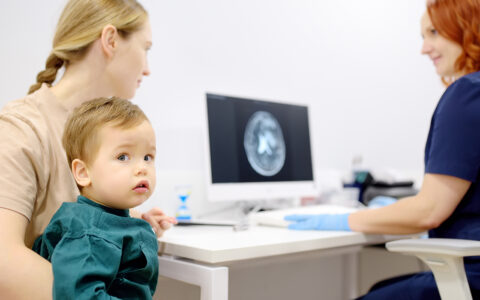Given mounting evidence that early diagnosis of Autism Spectrum Disorder (ASD) is possible and that very young children who receive intervention can demonstrate substantial gains in functioning, current American Academy of Pediatrics practice guidelines endorse formal ASD screening at 18 and 24 months. However, most children in the U.S. are not diagnosed with ASD until after age four. Delays in accurate diagnosis contribute to high levels of family stress and limit access to ASD behavioral intervention services.
“There are many tools on the market that allow pediatricians to screen children for autism — most of which are paper-and-pencil parent reports,” said Amy Weitlauf, Ph.D., an assistant professor of pediatrics at Vanderbilt University Medical Center. “Sometimes, when pediatricians get those questionnaires back, they want to go a step further and do something interactive with a child, but they don’t have the training, guidance or time to learn the tools that are available.”
“Sometimes, pediatricians want to go a step further and do something interactive with a child, but they don’t have the training, guidance or time to learn the tools that are available.”
To address this gap, researchers from Vanderbilt Kennedy Center Treatment and Research Institute for Autism Spectrum Disorders (TRIAD), along with partners from technology start-up Adaptive Technology Consulting, have been awarded a grant from the National Institute of Mental Health to evaluate a new mobile app designed to help pediatricians recognize autism risk in very young children.
Help from a Mobile App
The app, called Autoscreen, walks pediatric providers through a short series of play activities and guides them through a set of observations designed to calculate a child’s autism risk. The goal is to shorten the time between initial concerns of autism to diagnosis, which currently can take months, if not over a year, for many families.
Autoscreen takes less than 20 minutes to complete and provides an easy-to-use, affordable, guided tool to help providers make decisions regarding risk and initiate conversations with families. Instructions for each activity are fed audibly to the provider through a Bluetooth earpiece.
Developing the Algorithm
The algorithm for the screener, developed for TRIAD by Joshua Wade, M.S., and Nilanjan Sarkar, Ph.D., who both have ties to the Vanderbilt University School of Engineering and co-founded Adaptive Technology Consulting, was created by conducting an advanced computational analysis of data from gold-standard evaluation tools and clinical observations of more than 700 children evaluated for autism.
“Unlike other screening tools, Autoscreen provides an assessment of autism based on quick and meaningful in-person clinical observations without extensive training or expensive materials,” Wade said.
In phase I of the study, the app demonstrated an accuracy rate of 80 percent in predicting whether participants from a group of 42 children would receive a diagnosis of autism, as confirmed by a formal evaluation. Phase II of the study, recently funded by the NIMH, will enroll 200 children between the ages of 18 and 36 months, including those who are neurotypical or at risk for other developmental disorders.
Feedback for Training and Practice
The trial will also allow primary care providers, specialty clinicians and early interventionists to practice using the app and provide feedback for improvement. “This technology has the potential to radically advance how we talk about and act on autism risk in pediatric offices,” said Zachary Warren, Ph.D., an associate professor of pediatrics and principal investigator on Vanderbilt’s portion of the project.
“This technology has the potential to radically advance how we talk about and act on autism risk in pediatric offices.”
Features planned for the future include language variances and integration with EHR systems. “Our tool will ultimately be designed as a practical, feasible, and reimbursable health-screening module for wide-scale use in community pediatric settings,” Warren said.






